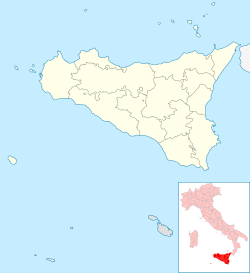Cassaro (Sicilian: Càssaru, in the local dialect: Càssuru) is a town and comune (municipality) in the Province of Syracuse, Sicily (Italy). The name of Cassaro probably derives from the Latin word castrum 'castle', 'fort', 'fort' or 'military camp', 'castle'. Cassaro is 52 kilometres (32 mi) from Ragusa and 35 kilometres (22 mi) west of the city of Siracusa. Cassaro has 859 inhabitants.[3]
Cassaro | |
|---|---|
| Comune di Cassaro | |
 | |
| Coordinates: 37°6′N 14°57′E / 37.100°N 14.950°E | |
| Country | Italy |
| Region | Sicily |
| Province | Syracuse (SR) |
| Government | |
| • Mayor | Mirella Garro |
| Area | |
• Total | 19.62 km2 (7.58 sq mi) |
| Elevation | 560 m (1,840 ft) |
| Population (30 November 2017)[2] | |
• Total | 780 |
| • Density | 40/km2 (100/sq mi) |
| Time zone | UTC+1 (CET) |
| • Summer (DST) | UTC+2 (CEST) |
| Patron saint | St. Joseph |
| Saint day | Last Sunday in July |
| Website | Official website |
History
editAccording to the Capibreve of Silvestri, in the Middle Ages the town belonged to the Spadafora family. Margherita Moleti Spadafora married the Baron Pietro Siracusa, who belonged to one of the oldest families in the town of Noto and was also Baron of Monastero and Xiridia. The Siracusa dynasty (formerly known as "Zaragoza") is of Spanish origin, documented in Sicily since 1283. Members of this Family has been also the lords of Collesano, counts of Villalta and dukes of Casteldimirto. Records are in the State Archive of Palermo (Fondo Protonotaro). Beatrice Siracusa, the only daughter of the above-mentioned Pietro and Margherita Siracusa (who are also ancestor of the Queen Paola of Belgium) married Pietro Gaetani Baron of Sortino. Beatrice died with her son Guido during the earthquake of 1452. Their possessions passed to her son Cesare, ancestor of the actual Princes of Cassaro. The current princess is Sara Tononi.[4]
Main sights
editSights in Cassaro include the Mother Church, dedicated to Saint Peter (started in the 17th century and ended in 1730), and the Church of Saint Anthony the Abbot (17th-18th century).
References
edit- ^ "Superficie di Comuni Province e Regioni italiane al 9 ottobre 2011". Italian National Institute of Statistics. Retrieved 16 March 2019.
- ^ "Popolazione Residente al 1° Gennaio 2018". Italian National Institute of Statistics. Retrieved 16 March 2019.
- ^ "Demo - Statistiche demografiche". demo.istat.it. Retrieved 9 May 2024.
- ^ More information can be found at the State Archive of Siracusa (Fondo Gaetani Specchi)


